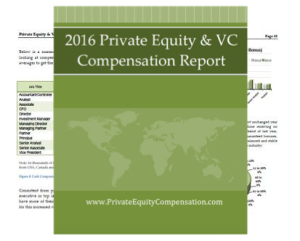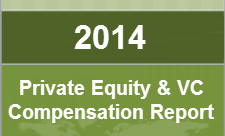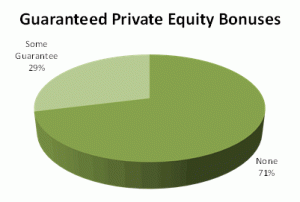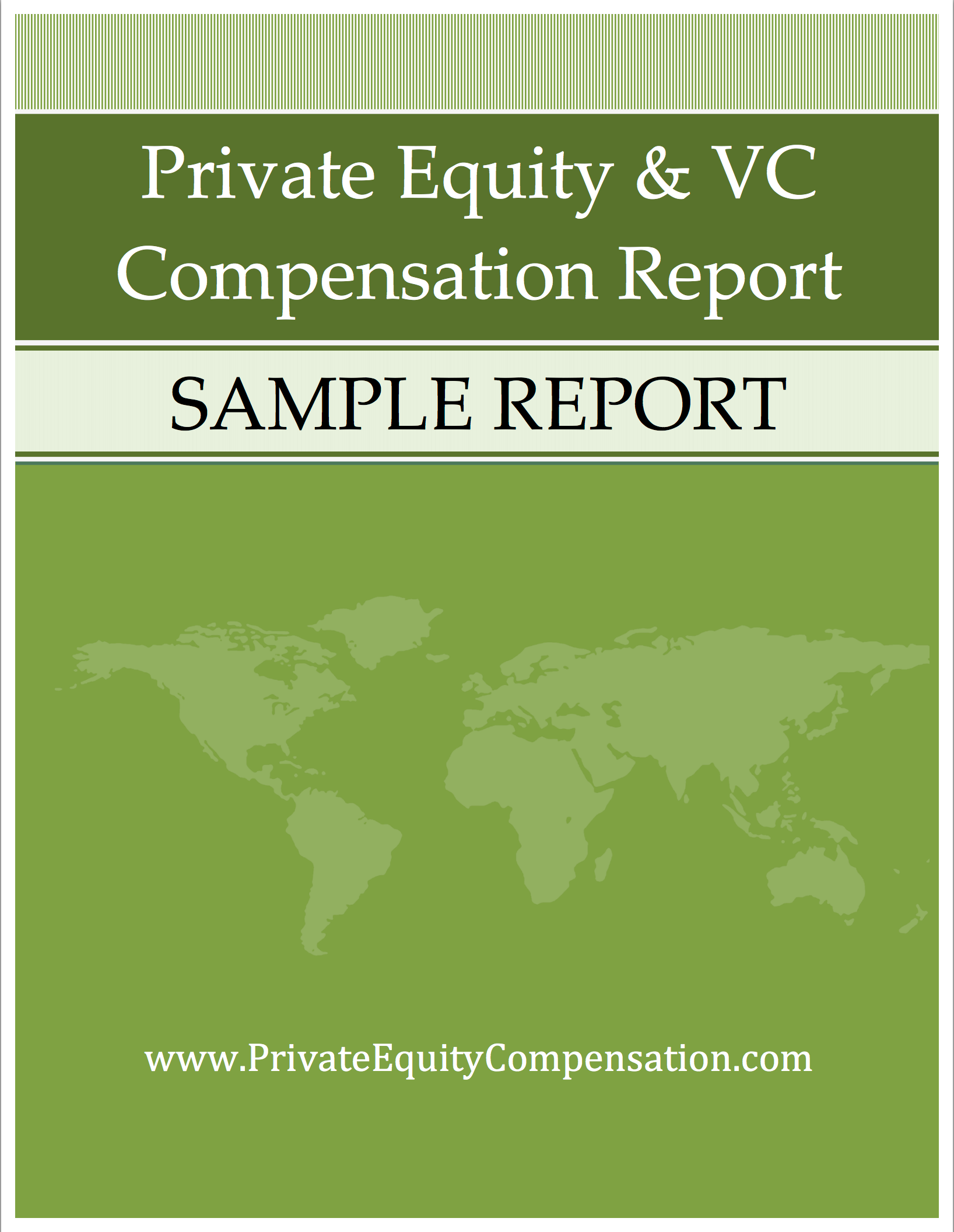Jan 20, 2016 | Press
The Private Equity Compensation Report for 2016 Uncovers Disconnect Between Fund Performance and Cash Bonuses
Cash increases slow while the demand for private equity talent increases.
SAN DIEGO, CA, January 20, 2016 — The 2016 Private Equity & Venture Capital Compensation Report, released today, shows that slower industry activity is reflecting in private equity and venture capital pay.
Although 65 percent of professionals reported an increase in expected salaries and bonuses, the growth in cash compensation has slowed. This year’s average compensation for private equity and venture capital professionals was $272,000 USD, a slight decrease from last year.
This marks the second consecutive year of diminished correlation between bonus pay and firm performance. Respondents working in  firms that were down 10 percent or more, report anticipated bonuses averaging $43,000 USD. This disconnect continued to surface in firms down 1 to 9 percent, with these survey participants expecting bonuses to average $94,000. In contrast, respondents working in firms that realized gains between 1 to 9 percent were expecting an average $91,000 in bonus pay, $3,000 less than their counterparts in firms that were down by the same range.
firms that were down 10 percent or more, report anticipated bonuses averaging $43,000 USD. This disconnect continued to surface in firms down 1 to 9 percent, with these survey participants expecting bonuses to average $94,000. In contrast, respondents working in firms that realized gains between 1 to 9 percent were expecting an average $91,000 in bonus pay, $3,000 less than their counterparts in firms that were down by the same range.
The private equity job market, however, continues to shine. “Funds are looking to put their capital to work, that means deal sourcing talent is at a premium,” said David Kochanek, Publisher of PrivateEquityCompensation.com. This year’s report reveals that 45 percent of firms are looking to hire additional investment professionals.
Says Kochanek, “With all the dry powder firms are sitting on, we were not surprised to see increased demand for investment talent again this year. Further, based on the expensive multiples seen in recent strategic exits, we won’t be surprised to see demand increase over the next 12 months for professionals with deep due diligence experience.”
As seen in prior years, when the demand for talent is high, the level of satisfaction with overall compensation is low. Again this year, more than half of respondents described their compensation as unsatisfactory.
About The Report
The 2016 Private Equity and Venture Capital Compensation Report is based on data collected from hundreds of private equity and venture capital partners, principals and employees through direct surveys. The report, in its ninth year of publication, is widely regarded to be among the most comprehensive benchmarks for private equity and venture capital compensation. It opens the door to trusted, independent and impartial data covering a broad range of salary, bonus, carried interest and other compensation related information, sourced from respondents working within the industry.
Some of the participating firms over the years include: Alpinvest Partners, American Capital, Battery Ventures, BlackRock, Carlyle, Century Capital Management, Cerberus, Comcast Ventures, DuPont Capital Management, EdgeStone Capital Partners, GE, Guggenheim Partners, Highland Capital Partners, Hilco Consumer Capital, Intel Capital, Mission Ventures, Mohr Davidow, North Atlantic Capital, RBC Capital Partners, RBS, Safeguard Scientifics, SV Life Sciences, Siemens Venture Capital, TPG, Venrock, and Warburg Pincus.
Jan 14, 2014 | private equity compensation
The seventh annual Private Equity and Venture Capital Compensation Report, released by the consulting firm Benchmark Compensation, indicates compensation growth in the private equity and venture capital markets is slowing.
Although private equity professionals in certain roles reported increases in compensation this year, overall, the growth in cash compensation flattened from last year’s numbers. The average private equity professional worked more than 60 hours per week and earned $271,000 USD in cash compensation this year.
 When it came to compensation changes by job title, some positions outperformed others, with Managing Partners, Principals, Directors and Investment Managers seeing some of the biggest increases. In the junior ranks of the firm, analysts, senior analysts, associates and senior associates all saw fairly modest gains.
When it came to compensation changes by job title, some positions outperformed others, with Managing Partners, Principals, Directors and Investment Managers seeing some of the biggest increases. In the junior ranks of the firm, analysts, senior analysts, associates and senior associates all saw fairly modest gains.
“We were closely watching cash compensation trends in 2013 because we anticipated that the carried interest tax break was in jeopardy,” said David Kochanek, Publisher of PrivateEquityCompensation.com. “It looks like carry will live to fight another day, so we don’t think we will see any major shifts in how private equity and venture capital compensation is structured in the near term.”
Due to the correlation with position within the firm, work experience remains a leading factor in carried interest allocations. At the 6 to 9 years of experience range, the percentage of professionals participating in carry increases significantly. After 10 years in the workforce, however, the participation percentage is relatively flat.
On average, bonuses comprised 39 percent of this year’s cash compensation total and contributed more than 70 percent of cash earnings for those taking home more than $1 million.
In most cases, cash compensation increased along with the size of the fund. Those in analyst positions saw the biggest difference in cash compensation between small and large funds. Analysts at big funds, on average, earned nearly double that of their peers in smaller funds. “Although somewhat higher base salaries were in place for the analysts at larger funds, this differential was mostly bonus dependent,” said Kochanek.
About The Report
The 2014 Private Equity Compensation Report is based on an industry survey conducted in October and November 2013. Data was collected directly from hundreds of private equity and venture capital partners and employees. The full report can be purchased at http://www.PrivateEquityCompensation.com
The Report has grown to be the most comprehensive benchmark for private equity and venture capital compensation practices. Some of the participating firms over the years include: Actis, American Capital, Bain Capital, Battery Ventures, BlackRock, Carlyle, Century Capital Management, Cerberus, Comcast Ventures, DuPont Capital Management, EdgeStone Capital Partners, GE, Guggenheim Partners, Highland Capital Partners, Hilco Consumer Capital, Intel Capital, Mission Ventures, Mohr Davidow Ventures, North Atlantic Capital, RBC Capital Partners, RBS, Safeguard Scientifics, SV Life Sciences, Siemens Venture Capital, Venrock, Warburg Pincus, and Wellington Partners.
Dec 30, 2012 | Industry
The 2013 Private Equity and Venture Capital Compensation Report demonstrates that the private equity and venture capital markets are continuing to enjoy increases in compensation and that 2013 will bring additional compensation increases.
Less Focus on Financial Engineering
Years ago, the upside in private equity was achieved primarily through financial leverage… LBO’s were the key to return on investment. Today, with aging portfolios, firm’s are focusing on the long term success of portfolio companies. Firms are assembling appropriate capital structures and teams to execute a long term growth plan.
Deal structure is only the beginning. The combination of cost savings from operational improvements and increased top line performance result in tremendous margin growth and increases in company value.
Good Times for Private Equity
It seems this new focus in private equity has resulted in a competitive market for talented investment professionals. More than half of respondents expected their cash compensation to increase over last year, and more than 40 percent expected to wrap the year end with double digit increases.
Private equity professionals reported increases in both base and bonus compensation. The average professional earned over $270,000. Bonuses comprised over one third of this year’s mean cash compensation, with the highest earners realizing bonuses that made up more than 60 percent of their total cash compensation.
This year, even professionals at small firms reported higher base and bonus compensation. This is likely due to the new competition for these talented professionals.
Romney Raised Awareness of Private Equity
The 2012 presidential election brought with it discussion about the value of private equity in terms of its contribution to job growth and overall economic benefit. Despite democrats trying to paint private equity firms as single-minded entities willing destroy companies in effort to maximize return on investment, the reality is that these firms focus on growth, benefiting both the shareholders and employees.
The industry is performing well and has a positive outlook for 2013 and beyond. Professionals will continue to see healthy increases in base salary and, as long as portfolio companies continue to grow, bonuses will follow suit.
About The Report
The 2013 Private Equity Compensation Report is based on an industry survey conducted in October and November 2012. Data was collected directly from hundreds of private equity and venture capital partners and employees. The full report can be found at http://www.PrivateEquityCompensation.com
The Report has grown to be the most comprehensive benchmark for private equity and venture capital compensation practices. Some of the participating firms over the years include: Actis, American Capital, Bain Capital, Battery Ventures, BlackRock, Carlyle, Century Capital Management, Cerberus, Comcast Ventures, DuPont Capital Management, EdgeStone Capital Partners, GE, Highland Capital Partners, Hilco Consumer Capital, Intel Capital, Mission Ventures, Mohr Davidow Ventures, North Atlantic Capital, RBS, Safeguard Scientifics, SV Life Sciences, Siemens Venture Capital, and Wellington Partners.
Dec 16, 2011 | Industry
Both Base Salaries and Bonuses are Up Again this Year Despite Some Job Security Concerns
SAN DIEGO, CA, December 19, 2011 — A report released today by PrivateEquityCompensation.com indicates the private equity and venture capital markets are continuing to enjoy increases in compensation and that the trend that will extend into 2012.
For the second year in a row, private equity professionals reported a solid increase in total earnings over the previous year, with the average cash earnings coming in at $248,000 USD, coming in the form of both increased base salaries and bonuses. The average expected increase was 6 percent and, again this year, more than 40 percent of professionals expected double digit increases over last year.
2011 brought with it plenty of fund raising activity and, it was clear from the report, the success of that activity was all over the board. The smaller funds continue to do most of the work, yet the larger funds get most of the money. This inequity is partially responsible for over half of respondents indicating they have some job security concerns.
 Despite smaller assets under management, employees at smaller firms reported higher earnings and some guaranteed bonuses. “We believe the demand for private equity talent in the larger firms is forcing the smaller firms to keep pace, in order not to lose their most talented players,” says David Kochanek, publisher of PrivateEquityCompensation.com.
Despite smaller assets under management, employees at smaller firms reported higher earnings and some guaranteed bonuses. “We believe the demand for private equity talent in the larger firms is forcing the smaller firms to keep pace, in order not to lose their most talented players,” says David Kochanek, publisher of PrivateEquityCompensation.com.
Different from past reports, the venture capital firms led the charge in base compensation increases; the downside this year was that their average bonus decreased. “That’s not totally unexpected as last year we reported that VC firms were paying the highest bonus percentages of all the firm types,” said Kochanek.
Last year, 85 percent of those reporting said their fund’s performance was in the black. This year’s expectations are a bit tempered, as 73 percent are projecting a positive year. Unlike last year’s Private Equity Compensation Report, this year there was a disconnect between fund performance and bonuses. If a fund was even or down, good sized bonuses are still expected and some even guaranteed.
Will this positive trend continue? “We believe 2012 will bring with it increased base salaries and healthy bonuses once again,” said Kochanek. “Expect continued demand for investment professionals and talented operationally-focused players to work in portfolio companies – even if the economy continues to show lackluster improvements.”
About The Report
The 2012 Private Equity Compensation Report is based on an industry survey conducted in October and November 2011. Data was collected directly from hundreds of private equity and venture capital partners and employees. The full report can be found at http://www.privateequitycompensation.com.
The Report has grown to be the most comprehensive benchmark for private equity and venture capital compensation practices. Some of the participating firms over the years include: 3i, Actis, American Capital, AXA Private Equity, Babson Capital Management, Bain Capital, Barclays Capital, BlackRock, Carlyle, Century Capital Management, Clairvest, Comcast Ventures, CPP Investment Board, Deutsche Bank, DuPont Capital Management, EDC Equity, EdgeStone Capital Partners, Global Environment Fund, Highland Capital Partners, Hilco Consumer Capital, Kaiser Permanente Ventures, Kayne Anderson, Mission Ventures, Mohr Davidow Ventures, North Atlantic Capital, Qualcomm, RBS, Safeguard Scientifics, SV Life Sciences, Siemens Venture Capital, Time Warner Investments, and Wellington Partners.
About PrivateEquityCompensation.com
PrivateEquityCompensation.com is a division of Job Search Digest, a web-based career service catering to professionals in private equity, venture capital, hedge fund and investment banking since 2002. Annually, the firm collects compensation data directly from hundreds of private equity and venture capital partners and employees from firms both large and small. The firm also publishes a blog on private equity and VC careers which can be found at www.InsideTheFirm.com
 firms that were down 10 percent or more, report anticipated bonuses averaging $43,000 USD. This disconnect continued to surface in firms down 1 to 9 percent, with these survey participants expecting bonuses to average $94,000. In contrast, respondents working in firms that realized gains between 1 to 9 percent were expecting an average $91,000 in bonus pay, $3,000 less than their counterparts in firms that were down by the same range.
firms that were down 10 percent or more, report anticipated bonuses averaging $43,000 USD. This disconnect continued to surface in firms down 1 to 9 percent, with these survey participants expecting bonuses to average $94,000. In contrast, respondents working in firms that realized gains between 1 to 9 percent were expecting an average $91,000 in bonus pay, $3,000 less than their counterparts in firms that were down by the same range.
 When it came to compensation changes by job title, some positions outperformed others, with Managing Partners, Principals, Directors and Investment Managers seeing some of the biggest increases. In the junior ranks of the firm, analysts, senior analysts, associates and senior associates all saw fairly modest gains.
When it came to compensation changes by job title, some positions outperformed others, with Managing Partners, Principals, Directors and Investment Managers seeing some of the biggest increases. In the junior ranks of the firm, analysts, senior analysts, associates and senior associates all saw fairly modest gains. Despite smaller assets under management, employees at smaller firms reported higher earnings and some guaranteed bonuses. “We believe the demand for private equity talent in the larger firms is forcing the smaller firms to keep pace, in order not to lose their most talented players,” says David Kochanek, publisher of PrivateEquityCompensation.com.
Despite smaller assets under management, employees at smaller firms reported higher earnings and some guaranteed bonuses. “We believe the demand for private equity talent in the larger firms is forcing the smaller firms to keep pace, in order not to lose their most talented players,” says David Kochanek, publisher of PrivateEquityCompensation.com.